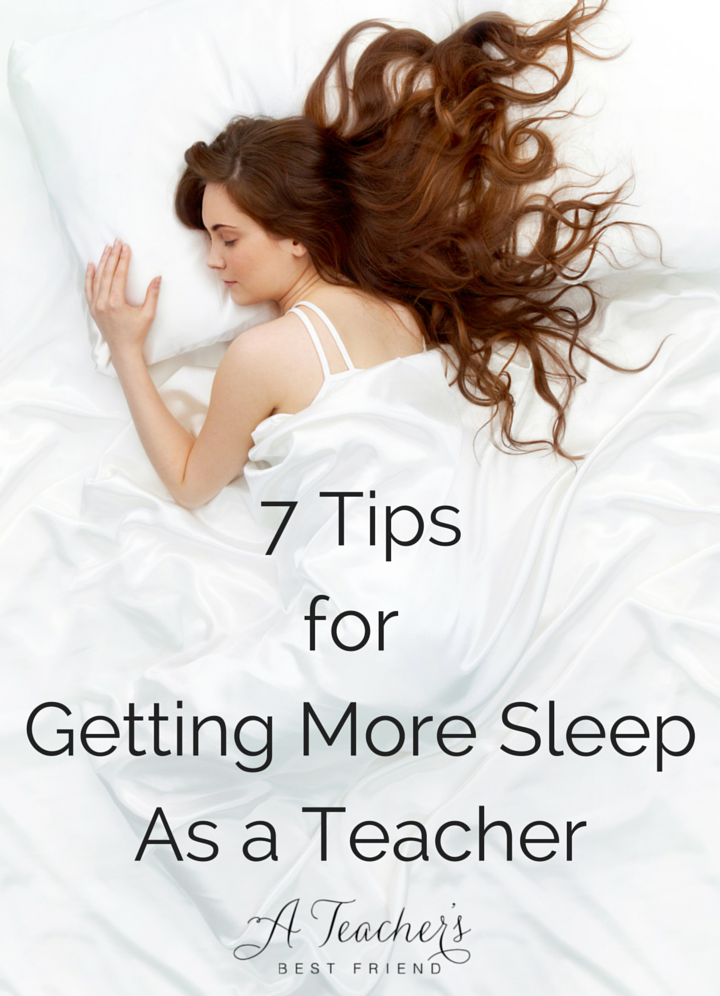Teaching is an extremely draining activity – both physically and mentally. Standing all day, strutting our fast-paced “Teacher Walk”, and at least 500 squats to desks. Plus add in emotional fatigue, and it’s no wonder we’re exhausted!
Sleep is our body’s natural way of nourishing and replenishing our resources. But most of us teachers are completely sleep deprived. How can we get more sleep as teachers?
Most of us suck at this.
A client of mine described it as this –
Her: “I stay up late because I don’t want the evening to end.”
Me: “What is underneath that?”
Her: “Well, I guess at some level, I know tomorrow morning will be ‘back to the grindstone’, so I want to keep resting [by hanging out with my boyfriend on the couch]”
I could totally relate. Can you?
Why is Sleep Good for Us?
Sleep is actually WAY more important than you might think. Dr. Michael Roizen, chief wellness officer of the Cleveland Clinic, put it, “Sleep is the most underrated health habit.”
In fact, here is what Arianna Huffington (self-proclaimed sleep evangelist after she had an almost-fatal fainting spell diagnosed as “exhaustion”) had to say about sleep in her book, Thrive:
There’s practically no element of our lives that’s not improved by getting adequate sleep. And there is no element of life that’s not diminished by a lack of sleep…Our creativity, ingenuity, confidence, leadership, and decision making can all be enhanced simply by getting enough sleep.
Here are some of the statistics and studies about the importance of sleep:
- Sleep deprivation negatively impacts our mood, our ability to focus, and our ability to access higher-level cognitive functions: the combination of these factors is what we generally refer to as mental performance (Drs. Stuart Quan and Russell Sanna, Harvard Medical School’s Division of Sleep Medicine)
- Poor sleep is associated with higher stress levels and a greater risk of heart disease and diabetes (Duke University)
- For the sleep deprived, an extra hour of sleep can do more for their daily happiness than a $60,000 raise (Science)
- People make bad judgement calls when sleep deprived, and REALLY bad things in history have been caused by sleep deprivation (like the Exxon Valdez Oil Spill)
- Sleep deprivation is actually a known torture technique (ouch!)
There is so much more I can’t even go into! But here are some resources if you want more facts:
- Arianna Huffington’s TED talk on Sleep
- Article: How Sleep Deprivation Decays the Body and Mind
Okay – you get it…so now how do we fix it?
7 Tips for Getting More Sleep As a Teacher
1. Get Real About How Much Sleep You Really Need
Most of us don’t know how much sleep we need because we rarely get that amount. That’s okay. Just start tweaking with the amount of sleep you get each night and then check in with yourself throughout the day to see how you feel. Once you’ve settled on the amount that is best for you – protect it with all your might! For now, start by increasing the amount you sleep by 15 or 30 minutes. Incremental change is still change!!
2. Set a Bedtime Alarm
It’s so easy to create alarms on our phones – so set an alarm for 30-minutes prior to what you want as your bedtime. When you hear the alarm, shut down devices, screens, chores, tasks, etc. and begin your nighttime routine.
3. Plan Your Evening Backward
Plan your evening backward from bedtime. So for example if your bedtime is 10pm, you’ll need to begin winding down (TV off, doing your nighttime routine) at 9:30pm, so whatever you need to do, shows you want to watch, or papers you want to grade, get it done before 9:30pm so you can make sure you are in bed on time. If you prioritize your bedtime like you do your wake time, you’ll be much more likely to actually get more sleep!
4. Cut Out the Caffeine after 2pm
I have never thought I was affected by caffeine so I would drink coffee even after dinner some nights. But then I started getting more sleep and realized caffeine does affect me – I was always just too sleep deprived to notice!! The general recommendation from sleep professionals is to cut out the caffeine after 2pm.
5. Have a Nighttime Routine
Create a set of rituals that you do before bed like a warm bath, drinking decaffeinated bedtime tea, reading, writing in your gratitude journal, meditating/praying, etc. This will cue your body that it’s time to sleep and you will have an easier time falling asleep.
6. Give Your Device a Curfew
There are very clear studies about the effect of “blue light” which is what our electronics give off on our brain’s ability to calm down. Give your device a curfew of at least 30 minutes prior to bedtime so your brain and body can begin to get cued that it’s time for bed.
7. Practice Deep Breathing
A few deep breaths before you go to bed will help you relax and will begin the body’s repair process.
Coaching Questions:
- Which of these tips resonated for you? How so?
- How do you want to integrate the tips listed here that could support you in getting more sleep?
Happy sleeping wonderful teachers!!

Leave a Reply